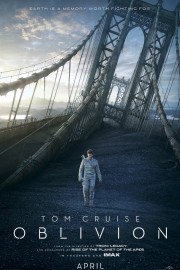Oblivion
Joseph Kosinski’s “Oblivion,” based on an idea he originally developed as a graphic novel, is hardly an original film, as it blends ideas from movies like “The Matrix,” “Wall-E,” “Dark City,” the “Planet of the Apes” films, “Independence Day,” and many others. That being said, Kosinski creates a highly original world, with these elements brought forth in a way that’s not only highly exciting on a cinematic level, but also on a more emotional one.
The film starts with the voice of Jack Harper (Tom Cruise), who, along with his colleague and wife, Victoria (Andrea Riseborough), have been left on Earth after an alien invasion that destroyed the moon, as well as the vast majority of the Earth. Now, the human race has abandoned the planet, colonizing the Saturn moon of Titan, as well as the Tet, a triangular station which is two weeks away from leaving for Titan. Earth has become uninhabitable after nuclear holocaust, and now, Jack and Victoria spend their time on drone maintenance, keeping track of machines sucking up the Earth’s oceans to create energy, and staying alive by avoiding the Scavs, the alien race that attacked us decades before. Victoria can’t wait to join the rest of humanity, while Jack still harbors a sense of Earth as being his home, especially in memories of the Empire State Building, as well as images of a woman (Olga Kurylenko) he had feelings for. He’s even set up a house by the lake in one of the few places left on the planet with forest area, where he goes, and finds a sense of peace.
From there, it’s difficult to discuss the film by going into depth, because a big part of what makes “Oblivion” such a strong, smart science-fiction epic is that we don’t see certain revelations coming. Of course, one thing we DO see coming is the introduction of Morgan Freeman as a human resistance leader, hiding out underground on Earth. But who, or what, are they resisting? For the answer to that, you’ll have to see the movie itself. Admittedly, the screenplay by Kosinski , Karl Gajdusek, and
Michael Arndt (who is now writing “Star Wars: Episode VII”) has some simplistic ideas, and conforms a lot to formula in the same way Kosinski’s first film, “TRON: Legacy,” did; however, there’s a considerable emotional core, and a question of what makes us human, that sets it apart from his earlier film.
A couple of years ago, another genre thriller came out from Universal Pictures, who released “Oblivion,” that took me by surprise with its emotional pull for me. That film was “The Adjustment Bureau,” with Matt Damon and Emily Blunt as two very different individuals who are, by seeming chance, brought together, and find themselves in a romantic race for what fate seems to want for them. “Oblivion” drew me in in much the same way the earlier film did. This is the element that actually worked strongest for me in “Oblivion”– as there’s an obvious connection we are to feel between Jack and Victoria, there’s an equally-strong one between Jack and Julia (Kurylenko’s character), the latter of whom enters the picture when an old spacecraft touches down one day at coordinates found in a signal headed out to the stars. The reasons for its arrival I will leave for the film to show you, but the arrival of Julia turns the film into a romantic triangle. However, I didn’t want to see either Victoria or Julia win out, because as we discover, both of them deserve happiness. This is where the performances really stand out, and Cruise, Kurylenko, and Riseborough all do terrific, affecting work that drives “Oblivion” narratively.
By comparison, the technical qualities of “Oblivion” are almost an afterthought, but needless to say, they are superb. The technology, like the Tet; the drones; Jack’s vehicles; and the place he and Victoria call home, are all exciting sights to see, and Kosinski’s use of special effects at the service of story is getting better. In this film, the personal story drives the film rather than the images it puts on-screen, and Kosinski is helped by the composers of the film score, M83, who created a soundscape just as potent and thrilling as Daft Punk’s score for “TRON: Legacy.” Thankfully, it all comes down to emotional story, especially in an ending like one we’ve seen dozens of times before, but still finds a way to make us care about this film, for all the right reasons.










